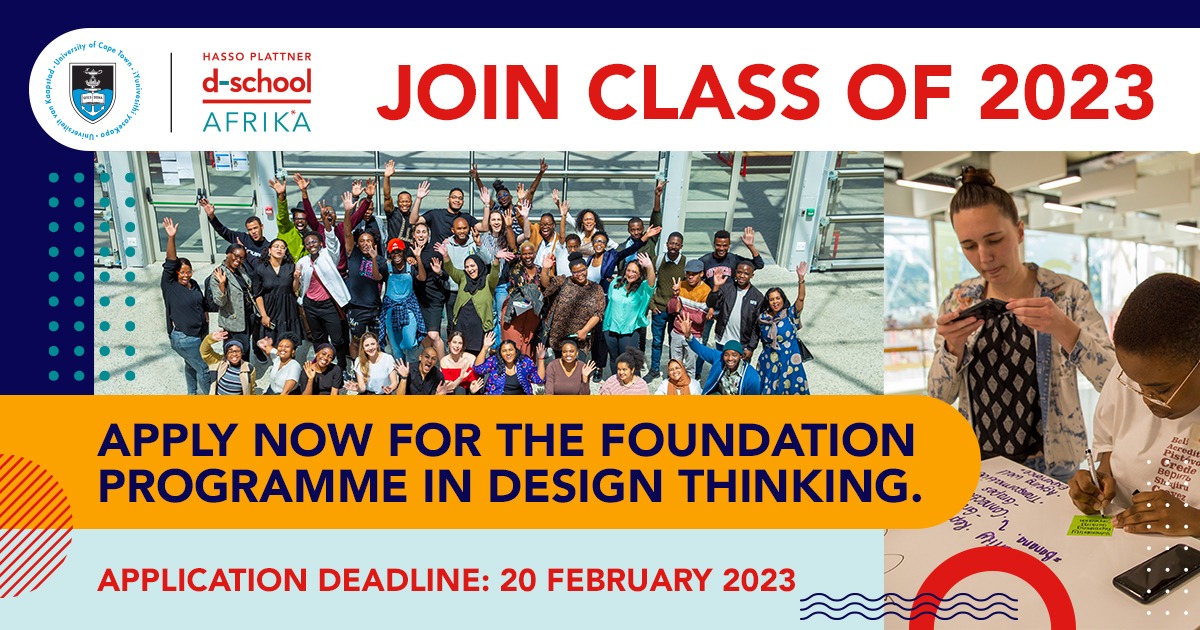
In a post-pandemic context, with countless definitions of the ‘Future of Work’ bombarding students – and adding to their growing angst around future employability – it becomes difficult for graduates to discern which skills to pay attention to and develop further.
In its Future of Jobs Report, the World Economic Forum lists attributes like “analytical thinking and innovation,” “complex problem-solving,” and “creativity, originality and initiative” amongst its top 10 professional skills required by 2025.
Design thinking as an academic offering nurtures these essential skills from the outset of its programmes and courses, such as those offered by the Hasso Plattner d-school Afrika at UCT.
“With design thinking being an approach to complex problem-solving, rooted in human needs analysis and understanding, as well as applied through collaborative creativity, incorporating design thinking exposure into a graduate’s skills arsenal can only be beneficial,” says Lucille Roberts, Head of Programmes at the Hasso Plattner d-school Afrika at UCT.
Lucille continues, “Design thinking can also enhance a graduate’s ability to navigate uncertainty, thereby further strengthening their competitive advantage in a crowded job market.”
Putting people and context at the centre
Recognising people – including their needs, contextual constraints and parameters, aspirations and preferences – is at the core of design thinking. Therefore, this human-centricity, underpinned by empathy, is the determining criteria for a given design thinking solution’s suitability or efficacy.
Consequently, this further solidifies design thinking as a top consideration for further skills development, with human-centred skills such as “leadership and social influence” also listed on the World Economic Forum’s top-10 skills.
“Our courses are designed to build communication and collaboration skills in diverse team settings,” says Lucille. “In this context, diversity isn’t narrowed down to only consider cultural and disciplinary diversity, but also actively seeks out neuro- and contextual diversity in the team makeup to further inform and enrich the solutions teams might propose as part of the design thinking process.”
As the philosophy underpinning design thinking clearly states, diversity in every spectrum - from race, culture, world view and perspective to skills, experience and insights - is vital for addressing the complex challenges faced by contemporary society.
Collaboration in diverse, multi-, inter-, and transdisciplinary teams is a characteristic of design thinking in action.
Responsiveness to context - the ability to deeply connect with local realities and appreciate local knowledge and systems - is necessary to develop appropriate and effective solutions.
Building creative confidence towards personal mastery
Listed fourth on the World Economic Forum list, “Creativity, originality and initiative” is another key skill to be nurtured amongst graduates entering the workforce. Building creative confidence is central to what schools like the Hass Plattner d-school Afrika do and nurture in the students that enrol for their programmes.
The fast pace of scientific and digital progress, combined with socio-political and economic uncertainty, requires a mindset that can imagine the future to create solutions that are not only based on data and certainty.
In the case of business, design thinking’s relevance has been noted across sectors and in a range of contexts. For example, according to McKinsey & Company, design thinking “can deliver a compelling end product and be disruptive enough to transform a company’s culture.
“The methodology is based on the insight that optimising individual touchpoints is insufficient to deliver a truly satisfactory overall journey—what is required is an end-to-end redesign. It is also informed by the understanding that consumers today do not separate products or services from the experience of buying and owning them. As a result, the entire “package” needs to be carefully designed.”
Starting the design-led journey
Design Thinking is more than a process or method used to solve a set of challenges. It's a mindset, a way of thinking that can be applied over again to new challenges in any setting. Design thinkers learn how to see real-world problems and use tools and techniques in a way that leads to innovative solutions no matter what their location or context.
The Hasso Plattner d-school Afrika's Foundation Programme in Design Thinking offers students a deep dive into the Design-led thinking mindset. According to Richard Perez, founding director of the d-school Afrika, "Students gain life-long skills for the future world of work and increase their likelihood of employment as we enable them to create human-centred solutions to real-world problems."
During this course, students will be introduced to working in culturally and cognitively diverse teams from various disciplines, discovering innovative digital learning tools, and building creative confidence.
Join the class of 2023. Apply for the Foundation Programme in Design Thinking today: https://dschoolafrika.org/learn-design-thinking/academic-student-courses/foundation-programme-in-design-thinking/
Copyright 2024 Hasso Plattner d-school Afrika*